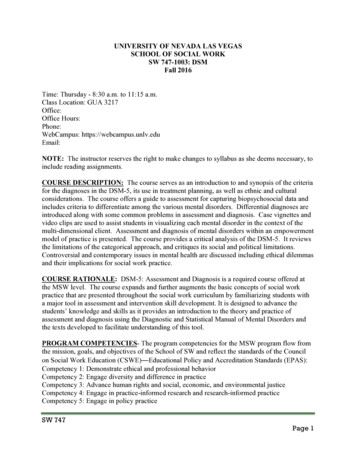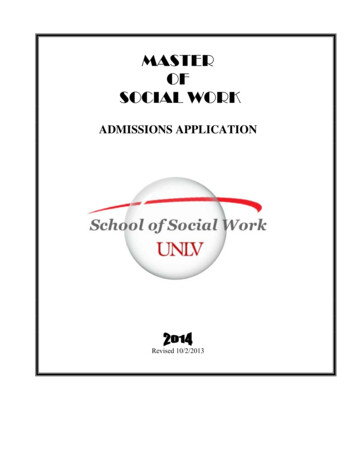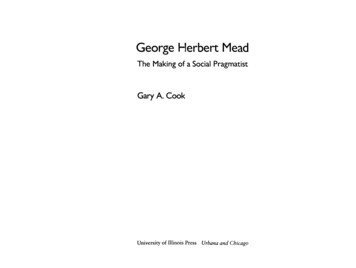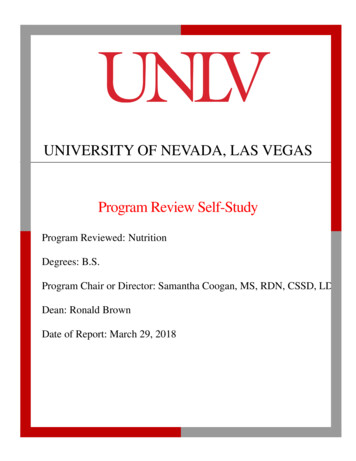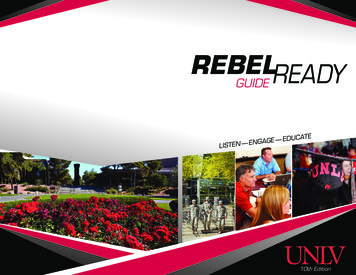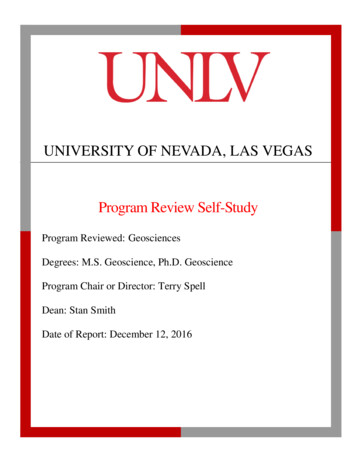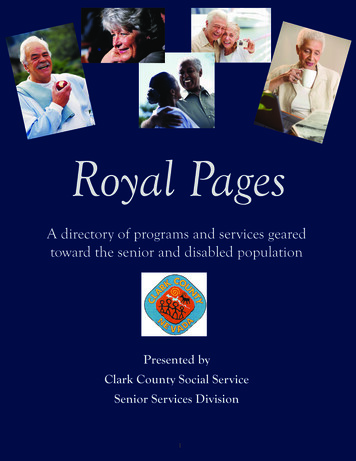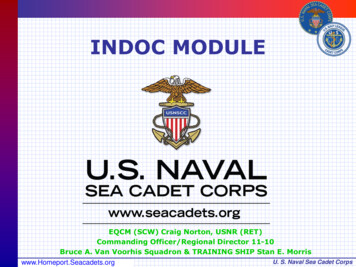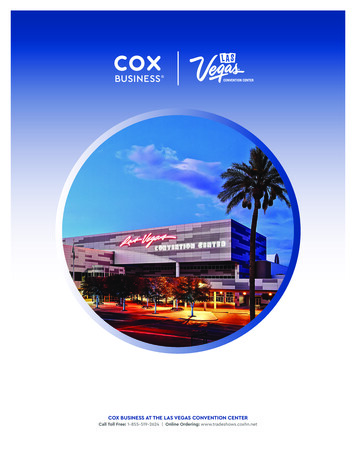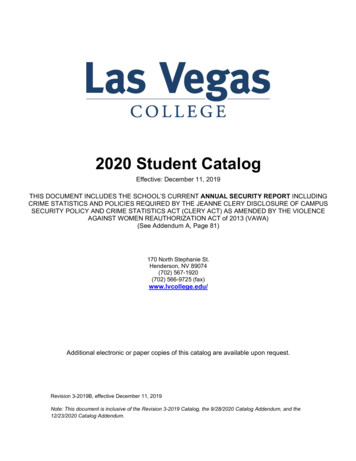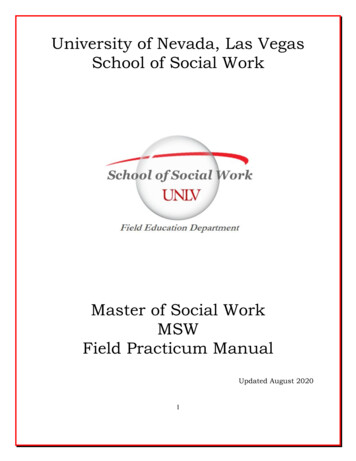
Transcription
University of Nevada, Las VegasSchool of Social WorkMaster of Social WorkMSWField Practicum ManualUpdated August 20201
First Things FirstImportant information for students:Students enrolled in Field Education are required to use their Rebelmail account forcommunication purposes. Please link your personal email to this account.All document submissions must be labeled/named with your Last Name first, First Name second,i.e. Public, John Fall 2018 Learning ContractAll required documents are on the UNLV School of Social orms. DO NOT use other forms.webpageThe Field Education Department has alphabetically designated a point of contact for agencies andstudents:Agency:Student:First letter of name of the agency (please do not include THE)A-JDelayna Tonogan, Assistant Director of Field (702) 895-3313delayna.tonogan@unlv.eduK-ZMarde Closson, Director of Field (702) 895-5848marde.closson@unlv.eduAcademic StandingBSW: Delayna Tonogan, Assistant Director of Field (702) 895-3313delayna.tonogan@unlv.eduMSW: Marde Closson, Director of Field (702) 895-5848marde.closson@unlv.eduPlease contact the appropriate staff member if you have any questions and/or concerns.All Field Education Documents referenced in this manual can be found on the Field EducationDepartment tionGraduate Assistants are available during the course of each semester (excluding Summer Term)for any document submission issues, and can be reached by email:socialworkfield@unlv.eduTerms Used:Directors of Field:Agency Field Instructor:Field Liaison:Electronically Submit:Includes Director and Asssistant Director of Field EducationUsed interchangeably with AFIUsed interchangeably with LiaisonSubmitted via email or other designated venues2
I. FIELD PRACTICUM SEQUENCE RATIONALEThe field practicum sequence is an extremely important component of the student'sprofessional development and is governed by the objectives of the MSW program’smission statement, the foundation curriculum, and the two (2) advanced curriculumconcentrations: Direct Practice, and Management and Community Practice. The fieldpracticum sequence provides students with a unique opportunity to realize the goalsand objectives of the program through concrete, practicum, and community-basedinteractions with clients and practicing professionals. In field practicum, studentsare supervised, monitored, and directed by Agency Field Instructors and School ofSocial Work Faculty Field Liaisons.The field practicum experience allows each student to apply to practice theacademic knowledge and skills acquired from all areas of the curriculum wherediversity, social justice, and attention to the needs of at-risk populations areemphasized. The field practicum sequence builds upon the generalist foundation,integrating systems theory, the problem-solving process, strengths perspective, andsocial work values and ethics. Field practicum provides opportunities for studentsto practice their skills evolving from generalist to more advanced techniques, and toapply their theoretical knowledge in settings where human conditions must berespected and enhanced. In essence, the field practicum sequence preparesstudents for social work practice with individuals, families, groups, organizations,and communities, particularly those encountered within the complex and dynamicurban environment of southern Nevada.II. ORGANIZING RATIONALEThe MSW practicum placements are organized into two broad categories generallyreferred to as “Foundation” and “Concentration.” When students participate in eachpracticum depends on whether they are enrolled in the full-time or part-time (3 yearor 4 year) programs. If a student is in the regular full-time program, the FoundationPracticum occurs during the first year of enrollment and the Concentration Practicumoccurs during the second year. A 3-year part-time student takes the Foundation andConcentration Practicum during their second and third years of enrollmentrespectively. A 4-year part-time student participates in this practicum during theirsecond and fourth years of enrollment. Because all practicum are classes, therequirements remain the same regardless of full-time or part-time status and allpracticum take place during the regular academic year, i.e. fall and spring semesters.Advanced Standing students complete one practicum generally referred to as the“Concentration” practicum.3
For 2020 Admissions onlyYour AdmissionWhen to take FieldProgram StatusPracticum CourseFull Time1st Year(2 Years)2nd YearPracticum Hours Per 15Week Semester150300Approximate PracticumHours Per Week1020 (minimum of 10 hours)Part Time(4 Years)Part Time(3 Years)AdvancedStanding2nd Year4th Year2nd Year3rd Year1503001503001020 (minimum of 10 hours)1020 (minimum of 10 hours)1st Year25517 (AdvancedStandingPart Time1st Year (no practicum)2nd Year0300020 (minimum of 10 hours)Foundation Practicum:The two Foundation Practicum courses, which are taken sequentially in the Fall andSpring semesters, are grounded in the generalist perspective, emphasizing problemsolving, cultural competence, and the bio-psycho-social practice model within asystems framework. Field agencies are encouraged to provide students withopportunities to observe and experience a range of social work activities at multiplelevels while building basic skills in communication, assessment, planning,intervention, and evaluation.Concentration Practicum:The advanced Concentration Practicum consists of Direct Practice (DP), andManagement and Community Practice (MCP) placements based on the student’s preselected area of focus. Within the Concentration Practicum, students build ongeneralist skills and knowledge, while participating in a more specificpracticum experience with individuals, families, and groups, or with communitiesand organizations. It is important to note that while students are expected toparticipate in activities specific to their concentration area of study, a thoroughunderstanding of social work practice at all levels remains an educational goal. Allpracticum are taken in conjunction with the corresponding practice methods coursesto enhance integration of advanced theory and practice. Activities and performancein each succeeding practicum must demonstrate a degree of increased skill,independence, and responsibility4
III. RELATIONSHIP OF FIELD PRACTICUM TO THE TOTAL PROGRAMThe MSW student will have completed undergraduate courses in related disciplinesincluding Human Biology, Principles of Economics, and Introduction to Sociology,General Psychology, and Cultural Anthropology. These courses are essential inproviding students with a broad liberal arts foundation and a perspective on which tobuild social work knowledge, values, and skills. Upon entering the field practicumcourses, students must follow their specified plan of study. All field practicum mustbe taken with the corresponding practice methods courses. Each course in a sequencebuilds upon the previous course, and provides students with theories and conceptsthat are to be integrated and applied to practice in the field.The social work practicum depends on the student building upon and integratingtheories from across the entire social work spectrum as experienced in all coursesand sequences. Activities provided by the wide variety of field agencies andprofessional networks within and beyond Clark County allow students to applyincreasingly complex concepts from courses in individual, family, group, andcommunity practice; human growth and development; social welfare policy; researchmethods; cultural competence, and supervision. Moreover, as research and evaluativeknowledge and skills develop, the student grows in his or her ability to criticallyassess the effectiveness of agency policies, procedures and practice methods inmeeting the needs of the community and clients at multiple system levels.Integration of theory and practice is facilitated through faculty review and feedbackin the development of Learning Contracts and Journals, Course Assignments drawnfrom the practice experience, and field seminar classes that focus specifically onintegrating field experience with curriculum content. Each student’s course syllabi isdistributed to Agency Field Instructors (AFIs) to enhance integration of course workin the field. In each subsequent field practicum, students are assisted in developingactivities that reflect growth and increased levels of complexity, skill, and autonomy.Information about the field practicum and its relationship to the total program isdisseminated in a variety of ways. This Field Practicum Manual is available for allfield practicum students, Agency Field Instructors (AFIs), and School of Social Workfaculty as it is posted on the School of Social Work Field Education website. FacultyField Liaisons meet face-to-face at least twice each semester with students andAgency Field Instructors (AFIs) to provide support and to clarify requirements of theprogram. Orientations for Agency Field Instructors and Preceptors are offered onceper year to encourage ongoing dialogue between the School and Agency FieldInstructors and to facilitate communication around educational goals, instructionalmethods, and techniques. The Orientation is mandatory for all new MSW AgencyField Instructors.5
Additional trainings may be offered throughout the year for Agency Field Instructors(AFIs) and Preceptors interested in further developing their instructor skills.Orientation and trainings offered supply CEUs through the State of Nevada Board ofExaminers for Social Workers.IV. MSW PROGRAM OBJECTIVES/COMPETENCIESUpon completion of the Master of Social Work degree, MSW students will be able toachieve the following competencies that are based upon the standards of the Councilon Social Work Education (CSWE) - Educational Policy and Accreditation Standards(EPAS).The program course assignments, practicum experiences and seminars will allowstudents the opportunity to achieve the following competencies:1. Demonstrate ethical and professional behavior.2. Engage diversity and difference in practice.3. Advance human rights and social, economic and environmental justice.4. Engage in Practice-Informed Research and Research-Informed Practice5. Engage in policy practice.6. Engage with individuals, families, groups, organizations, and communities7. Assess individuals, families, groups, organizations, and communities.8. Intervene with individuals, families, groups, organizations, and communities.9. Evaluate practice with individuals, families, groups, organizations, andcommunitiesTHE FIELD PRACTICUM IS DESIGNED TO:1.2.3.4.5.6.Help students develop skills in theory application at the micro, mezzo,and macro levels.Provide students with real world experiences of how social serviceagencies work with client systems.Help students investigate how concepts of social justice andmulticulturalism are implemented in the field.Assist students in identifying how generalist social work practice is basedon the core mission of the profession.Help students identify strengths and resources for client systems.Support students in integrating concepts about human behavior in thesocial environment into proficiency in working with individuals, families,groups, organizations and communities.6
7.8.9.10.11.V.Guide students in initiating and building upon client-workerrelationships.Help students understand the tasks of collecting and assessinginformation related to client concerns.Aid students in recognizing client issues, problems, needs, resources andassets.Facilitate students’ use of empirical knowledge and technologicaladvances in working with client systems.Help students become familiar with program outcome evaluationsinforming practice effectiveness.ASSIGNMENT TO A PRACTICUM AGENCY SITEA Field Practicum is defined as an experience in one (1) agency/organization that hasbeen contracted with the University and the School of Social Work. Because of liabilityinsurance issues, Field Education is not capable of tracking or allowing students tobe placed in multiple practicum sites simultaneously during the course of onesemester.Please follow these steps to secure a Practicum:Step 1 – The Resume and Cover Letter:Students entering a practicum search must first create a current Resume and CoverLetter describing their education, experience and objectives for field placement.Please contact UNLV Career Services at 702-895-3495.Step 2– Sign-up for Handshake:Please log in to Career Services https://www.unlv.edu/careerservices. Click onStudent Instructions and FAQs and follow the directions. Search for availablepracticums by clicking on jobs and in the search box type in Social Work Practicum.Available opportunities will be listed.Please note: Only agencies that have contracted as approved Field Practicum sites,i.e. have Educational Affiliation Agreements (EAA) with the University, may beconsidered for Practicums. If you encounter any problems with setting up anaccount or logging onto Handshake, please contact Career Services at702-895-3495.7
Step 3- Searching for Placements:In the search field, type in “Social Work Practicum” with quotation marks. This willbring up all of the practicum placement opportunities that are available. Once youlocate an agency you are interested in, just click the “Apply” button. Once you click“Apply” your resume will be sent directly to the Agency Field Instructor (AFI). You cancheck to see which positions you have applied to by clicking on the “Job Postings andOn-Campus Recruiting OCR Interviews” tab. From this tab you can click on the“Applications tab” which will bring up a window with all positions you have appliedto.Step 4 – The Agency Interview:The Field Education Program adheres to a “matching” philosophy; that is, practicumworks best when agencies and students “choose” each other. At the agency interview,either party - the student or the agency - may choose to accept or reject the other.Students are advised to interview at multiple agency sites to facilitate an informedchoice. Agencies are not obligated to accept any given student solely on the fact thatshe or he has been referred by the University. Similarly, after interviewing, studentsmay not accept agencies to which they have been referred. If there are no matches(based on practicum position availability, incompatibility of goals or some otherreasonable criteria), the student is advised to immediately contact their FieldEducation Department designated contact person.Step 5 – Practicum Site Selection:Once a student has been offered and has accepted a practicum at a particular site,she or he is to notify the Field Education Department by submitting the PracticumSelection Form located on the Field Education website. Upon providing thisinformation to the Field Education Department, the student is cleared to begin theirpracticum the first week of the semester if the agency and Agency Field Instructor(AFI) have been approved.Special Note: Part of professional behavior is in showing courtesy to the agenciesto which a student applies and colleagues. It is the student’s responsibility to notifyall agencies with whom the student interviewed that a practicum selection has beenmade, opening the opportunity for the agency to select another student. Once youhave selected your practicum site, please discontinue applying to additional sites.8
Step 6 – Agency requirements:Please note that some agencies may require background checks, drug testing,physicals and other medical screenings. Students are responsible for theseexpenses.Agencies may require students to attend orientation prior to the start of thepracticum. These hours are outside of the practicum and are unable to be countedas practicum hours.VI. FIELD PRACTICUM SETTINGS AND SELECTION CRITERIAIn order for the field practicum to be effective, it is imperative that the School of SocialWork and participating agencies work together in planning and carrying out theeducationally directed experience. At the same time, the School also recognizes thesocial responsibility of the agency toward its clients and the community, and is awareof the necessity of the educational objectives to be complimentary to those of theagency. The relationship between the University, the School, and the agency isoutlined in the Education Affiliation Agreement (EAA) and is formalized by the signingof this document. While the School retains primary responsibility for the quality ofthe educational experience, it can only carry out that responsibility throughcooperation and ongoing communication between the agency field instructors and theSchool. Field Education Program policy mandates that agencies provide the Schoolwith, among other documentation, a description of their program and practicumactivities to assist in appropriately matching students with the agency.The following are examples of agency practice areas that currently available to MSWstudents:Child Welfare- Abuse Investigation- Foster Care/AdoptionCommunity ActionDomestic ViolenceEducational/School Social WorkElder gal / ForensicMental Health- Inpatient and/or OutpatientSubstance AbuseSocial Service/Community ResourcesThe criteria established for the selection of field agencies is as follows. An established social welfare program with a clear-cut sanction from thecommunity.Commitment to the goals of professional social work education.9
Willingness to support the School’s educational objectives.Commitment to and the ability to provide the resources (space, time, andother support) needed by agency staff and students involved in the activitiesof instructional field practice.Availability of qualified staff to supervise MSW students.VII. CRITERIA FOR SELECTION OF AGENCY FIELD INSTRUCTORSAgency Field Instructors:Agency Field Instructors (AFIs) are vital members of the field training team and, withthe support of the Directors of Field Education, are charged with the responsibility toassure that the planning, teaching, and evaluation components of students' fieldpracticum experiences have a social work focus and are professionally sound.The criteria for selection of Agency Field Instructors are as follows. Master of Social Work degree. Two (2) years postmaster’s experience in the field. Six (6) months experience with the current agency. Licensed to practice professionally in the state of Nevada (preferred). Reputation for professional competence. Attitude of respect for students' competencies and needs. Ability and desire to teach social work theory and its application to professionalpractice. Demonstrated identification with the social work profession. Thorough knowledge of the purposes, policies, and procedures of the agency. Willingness to advance professional development as demonstrated bysuccessful completion of the MANDATORY Agency Field Instructor (AFI)Orientation as well as participation in other continuing educationopportunities.Agency Field Instructors (AFIs) must have a current resume on file with the FieldEducation Department.VIII. SCHOOL OF SOCIAL WORK AND AGENCY RESPONSIBILITIESThe School of Social Work will provide at the request of the field agency, necessaryand appropriate information about student(s) assigned to the agency, including10
academic background, previous social work and other work experience, career plans,and other relevant data if available.A. Director of FieldThe Director of Field will be responsible for: Providing the agency with the necessary consultation and support to carryout the educational program goals.Providing specific learning objectives to be used in planning the educationalprogram for students.Providing guidelines for evaluation of student progress.Obtaining regular feedback from the agency regarding the field program'sstrengths and limitations and recommending suitable modifications
IV. MSW PROGRAM OBJECTIVES/COMPETENCIES Upon completion of the Master of Social Work degree, MSW students will be able to achieve the following competencies that are based upon the standards of the Council on Social Work Education (CSWE) - Educational Policy and Accreditation Standards . Un


